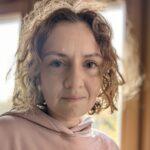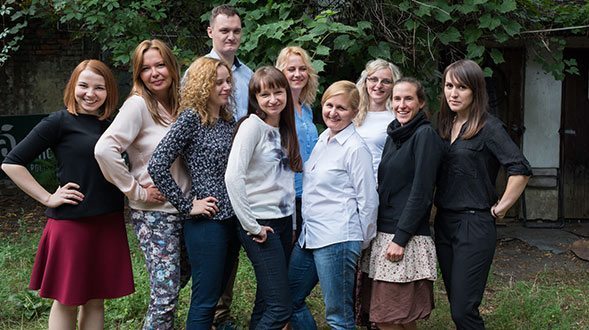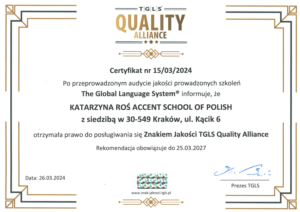Over 3,000 foreigners learn Polish with us every year

Join them and choose Accent, because here you will:
- find true Polish hospitality – 98% of our students appreciate the atmosphere we create together*
- meet teachers who will surprise you – we have a team of more than 60 exceptional teachers
- taste the specialties of Polish cuisine at our cooking workshops – additional workshops at least twice a month
- learn in small groups, which will help you achieve your goals and start speaking Polish – groups of 4 to 10 people!
- become friends with people from all over the world – our students have come from over 30 different countries
* results of surveys conducted between 2010 and 2015

At Accent School of Polish we have two goals:
1. TO TEACH EFFECTIVELY!!
- At the beginning of every course we give you a test (written and oral). The speaking part lets us analyze your needs – that’s when our future students answer several important questions: Why do you want to learn Polish? Which skills are most important to you? What are your expectations? etc.
Those who are beginners with no knowledge of Polish don’t need to write the test, but we still talk with them about their needs connected with the course and their stay in Kraków. - We teach in very small groups – 4 to 10 people!!! This enables us to adjust the course to the individual needs of EVERY student.
- The student needs analyses allow us to prepare specific syllabuses for groups at different levels of advancement. Every syllabus aims to include all the language skills, but it is the students’ needs that are the most important. We do focus of SPEAKING – as most students do want to first of all SPEAK Polish. Yet effective communication in Polish requires some knowledge of grammar. And so we artfully combine the teaching of the four language skills (speaking, writing, reading, listening) with teaching the elements of language (grammar, vocabulary, pronunciation, spelling).
- We continually monitor the didactic process: we do surveys to check student satisfaction during the course and tests to verify their progress; we also do classroom observations. There is a final test at the end of each course, and this, together with the grades from the entire semester, is the basis of the final progress report, which provides descriptive feedback on each of the language skills. The teacher also includes suggestions for further study.
2. TO TEACH IN AN ENGAGING WAY!
- We make sure that class time is used to the fullest. Thanks to the small size of the groups, every student gets a chance to be active in the classroom. We expect our students to be fully invloved, and we find a way to motivate them to also do some homework.
- We use Polish ONLY for speaking, even at begginer level. This puts students in real communicative situations and enables them to develop all the language skills.
- Authentic materials often find their way to our classrooms: we use newspapers and watch Polish films and tv shows. With us, you touch the vibrant Polish language, and the classroom transforms into a shop, a restaurant, a cinema, a doctor’s office, or even a street.
- The course is always enriched with an array of cultural events – during the evening get-togethers you can learn how to properly participate in a Polish wedding, find out how to make the famous ‘pierogi’, and discover Kraków itself.
- Our course syllabuses are based on the generally accepted framework of language levels (table – link). We use the best available coursebooks!
LANGUAGE LEVELS
(According to the Common European Reference for Languages: Learning, Teaching, Assessment CEF*)
survival
This level has not been recognised by CEF. It is used with reference to the least advanced users participating in very short courses. The course syllabus concentrates on simple everyday tasks. At this level the user familiarises himself/herself only with the basic pronunciation rules and simple phrases aimed at the satisfaction of everyday needs. The user knows about 300 – 500 words.
* Based on: E. Lipinska, A. Seretny, “Przewodnik po egzaminach certyfikatowych
Basic user: breakthrough
At this level the user can understand and use familiar everyday expressions and very basic phrases aimed at the satisfaction of needs of a concrete type. Can interact in a simple way provided the other person talks slowly and clearly and is prepared to help.
* Based on: E. Lipinska, A. Seretny, “Przewodnik po egzaminach certyfikatowych
Basic user: waystage
At this level the user can understand sentences and frequently used expressions related to areas of most immediate relevance. Can communicate in simple and routine tasks requiring a simple and direct exchange of information on familiar and routine matters.
* Based on: E. Lipinska, A. Seretny, “Przewodnik po egzaminach certyfikatowych
Independent user: threshold
At this level the user can understand the main points of clear standard input on familiar matters regularly encountered in work, school, leisure, etc. Can deal with most situations likely to arise whilst travelling in an area where the language is spoken. Can produce simple connected text on topics which are familiar or of personal interest.
* Based on: E. Lipinska, A. Seretny, “Przewodnik po egzaminach certyfikatowych
Independent user: vantage
At this level the user can understand the main ideas of complex text on both concrete and abstract topics. Can interact with a degree of fluency and spontaneity that makes regular interaction with native speakers quite possible without strain for either party. Can produce clear, detailed text on a wide range of subjects and explain a viewpoint on a topical issue.
* Based on: E. Lipinska, A. Seretny, “Przewodnik po egzaminach certyfikatowych
Proficient user: effective operational proficiency
At this level the user can understand a wide range of demanding, longer texts, and recognise implicit meaning. Can express him/herself fluently and spontaneously without much obvious searching for expressions. Can produce clear, well-structured, detailed text on complex subjects, showing controlled use of organisational patterns, connectors and cohesive devices.
* Based on: E. Lipinska, A. Seretny, “Przewodnik po egzaminach certyfikatowych
Proficient user: mastery
At this level the user can understand with ease virtually everything heard or read. Can express him/herself spontaneously, very fluently and precisely, differentiating finer shades of meaning even in more complex situations.
* Based on: E. Lipinska, A. Seretny, “Przewodnik po egzaminach certyfikatowych
I am glad to work among talented, proactive and enthusiastic people. Accent is a school of professionals and individual approach to everyone. Being a student of Polish myself I am eager to share with you all the secrets and life hacks of adaptation and learning Polish. Our team will answer all your questions and help to find the best Polish course for you :)
a

Ksenia Agonen Office Manager
Russian ——————————
English ————————
Polish —————
I’m happy to work with the team of such devoted people who help foreigners to stay in Poland in comfortable environment. I like working while there is a lot going on and I can meet many people from different countries. I hope to learn new things from my colleagues and also share my previous experience with them.
a

Danuta Tracz Office Manager
Polish ——————————
English ————————
Russian ————
+48 12 656 75 68
What I love most about my job is the great atmosphere and the chance to meet people from different parts of the world, different backgrounds, and different cultures. Each day here brings new challenges and inspirations, making it a unique experience. Doing the work entrusted to me gives me a lot of joy and satisfaction.
a

Iwona Gach Office Manager
Polish ——————————
English ————————
+48 12 656 75 68
I learned Polish not so long ago and as a former student I still remember the vibe significance while studying. The Accent School of Polish is not only classrooms, textbooks and homework. It is a special place where you really want to spend your time. Accent’s Teachers and students have created a community of like-minded people who really love what they do. I never feel bored during my working day, and that’s thanks to people who come here.

Elena Szarowa Office Manager
Russian ——————————
English ———————
Polish ——————




